
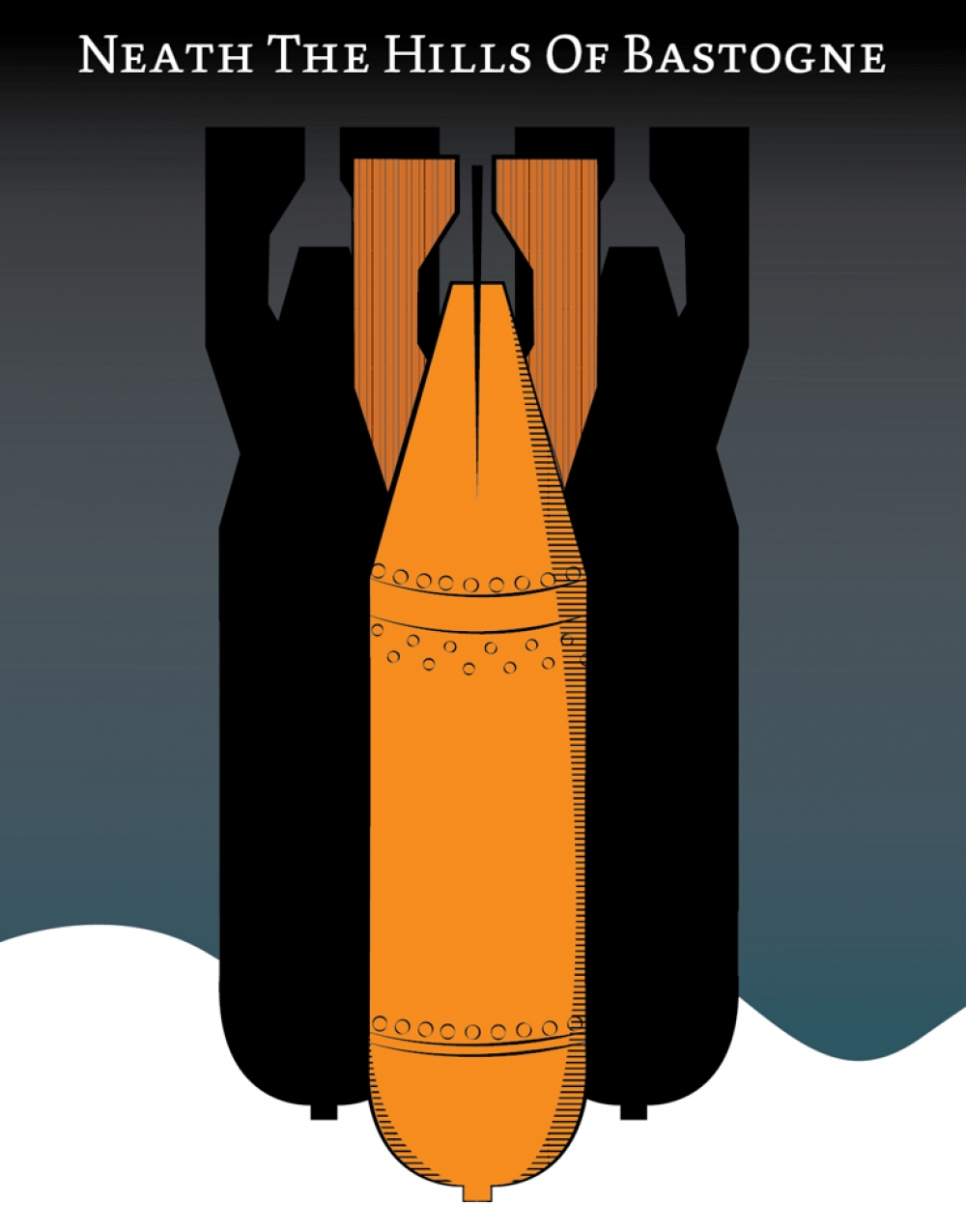
'Neath the Hills of Bastogne |
||
|
|
||
| a WORLD PREMIERE by Zach Thomas Woods | ||
|
|
Samantha Martinson |
|
|
|
||
|
|
|
|
Follow Us:
Notes from the Playwright: When I set out to write this play it had nothing to do with the Siege of Bastogne. In December 2014, I read an article highlighting the 100-year anniversary of World War I's Christmas truce. Early in the war, before the combatants were fully entrenched in their hatred for one another, enlisted men in France and Belgium agreed to put aside their rifles, rise from the trenches, and shake hands with the enemy. They played soccer and sang Christmas carols. For one day they weren't French or Germans, they were fellow humans. The next day they were back to shooting. This story touched me deeply and I immediately dove into the research for a play. In my readings, however, it quickly became clear that the remarkable thing about the Christmas truce wasn't that it happened, but that it never happened again. For hundreds of years prior to World War I, "gentlemen's truces" were extremely common. When winter reared its head, opposing armies would often hunker down until the snows cleared. December 1944 saw the end of this tradition. By then the Americans and Germans had been in direct conflict for over two years. Uncle Sam had humiliated Hitler in North Africa, Italy, and Normandy, but had received a serious bloody nose in Holland and the Hürtgen Forest. The men on both sides were bitter and angry. They had suffered and endured the unimaginable and yet the prospect of home was impossible as long as the enemy sat across the Rhine. That tension erupted into outright hatred with the jump off of Hitler's surprise attack on December 16, 1944. The offensive, which came to be known as the Battle of the Bulge, remains the largest military action in which the United States Armed Forces have ever participated. As thousands of young men died in the snow, there was little hope for a truce. But hope is a funny thing. Sometimes it manages to survive against all odds. The day after a particularly brutal push by the German Fifth Panzer Army against the village of Champs, a squad of Americans entered a school house formerly held by the enemy. Scrawled across the chalkboard was a message that read: "Let the world never see such a Christmas night again! To die, far from one's children, one's wife and mother, under the fire of guns, there is no greater cruelty. To take away a son from his mother, a husband from his wife, a father from his children, is it worthy of a human being? Life can only be for love and respect. At the sight of ruins, of blood and death, universal fraternity will rise." This quote is a reminder to us that history is all about perspective. War is the great equalizer. It reduces humanity to its base components and dares us to build something new. Will we rise to the heights or descend to the depths? Peace cannot exist without understanding, but understanding cannot exist without an open mind. Crafting this story opened my mind. I hope it does the same for you.
Cast
Creative Team
Zach Thomas Woods
Samantha Martinson
Colin Gawronski
Lauren Instenes
Meet the Company
Kaila Bingen
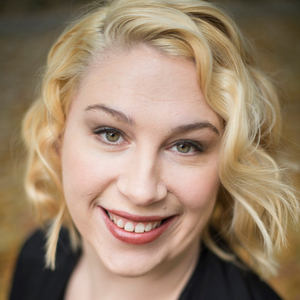 Kaila Bingen (Musician) is thrilled to be a part of this exciting new work and is thankful to share the experience with a phenomenal cast and creative team. Kaila is a theater artist, arts administrator, teacher, and musician from Kenosha. Kaila has performed on stage and in the pit orchestras of numerous productions in the past several years, including being the violinist for a new musical performed at the Chicago Musical Theater Festival and the New York Musical Theater Festival (off-Broadway). Last fall Kaila directed the first staged reading of her husband Rick's play, "Steal the Theatre", at Sunstone Studios, and she will be directing Sarah Ruhl's "Melancholy Play" in Kenosha later this spring with Fleeing Artists Theatre. Catch her this summer at all of Kenosha Opera Festival's events! This performance, and every performance after, is dedicated to Mom - I love you and miss you.
Kaila Bingen (Musician) is thrilled to be a part of this exciting new work and is thankful to share the experience with a phenomenal cast and creative team. Kaila is a theater artist, arts administrator, teacher, and musician from Kenosha. Kaila has performed on stage and in the pit orchestras of numerous productions in the past several years, including being the violinist for a new musical performed at the Chicago Musical Theater Festival and the New York Musical Theater Festival (off-Broadway). Last fall Kaila directed the first staged reading of her husband Rick's play, "Steal the Theatre", at Sunstone Studios, and she will be directing Sarah Ruhl's "Melancholy Play" in Kenosha later this spring with Fleeing Artists Theatre. Catch her this summer at all of Kenosha Opera Festival's events! This performance, and every performance after, is dedicated to Mom - I love you and miss you.
Christian Davis Aldridge
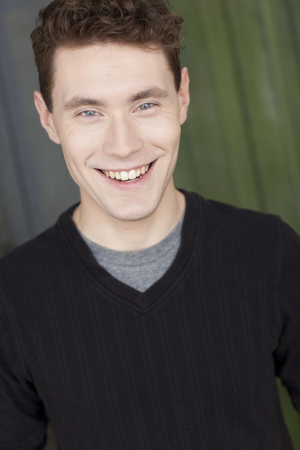 Christian has been grateful to be able to watch ‘NEATH THE HILLS OF BASTOGNE grow and change over the last several years. He has enjoyed the unique and wonderful opportunity to portray Aldrich and others in two previous iterations of the play, and sends his thanks to Zach, Samantha, and the rest of the Sunstone team for including him in this first full staging of the story. Credits include: THE THIRD RICHARD (The Trance), MERCURY HAMLET (Quicksilver Shakespeare), I LOVE YOU, YOU’RE PERFECT, NOW CHANGE (Quest Ensemble), RICHARD III (Muse of Fire), MACBETH (Bard and Bourbon), and GODSPELL (Red Crescendo). Christian sends his thanks to Keighley for generously making his participation possible, and he sends his love to his endlessly loving family, his incredibly supportive friends, and his impossibly wonderful fiancé Corrie.
Christian has been grateful to be able to watch ‘NEATH THE HILLS OF BASTOGNE grow and change over the last several years. He has enjoyed the unique and wonderful opportunity to portray Aldrich and others in two previous iterations of the play, and sends his thanks to Zach, Samantha, and the rest of the Sunstone team for including him in this first full staging of the story. Credits include: THE THIRD RICHARD (The Trance), MERCURY HAMLET (Quicksilver Shakespeare), I LOVE YOU, YOU’RE PERFECT, NOW CHANGE (Quest Ensemble), RICHARD III (Muse of Fire), MACBETH (Bard and Bourbon), and GODSPELL (Red Crescendo). Christian sends his thanks to Keighley for generously making his participation possible, and he sends his love to his endlessly loving family, his incredibly supportive friends, and his impossibly wonderful fiancé Corrie.
Anya Palmer
 An up-and-coming talent, Anya Palmer is determined to make her mark on both the film and theatre scenes. A Milwaukee native, Anya used her time during quarantine to improve her skills by taking online improv and voiceover courses at The Second City as well as ASC (Acting Studios Chicago), giving her the chance to work with veteran actors like Cooper Shaw and Brad Grusnick. At that time, she was also given the opportunity to work on the fully virtual production of Caryl Churchill’s 'Love and Information.'
Most recently, she wrapped up a performance in the show 'Between Two Rivers' at Sunstone Studios - her theatrical debut. Anya is very excited to be returning to Sunstone for its latest production, and hopes to take on more complex characters like Emma in her future.
Outside of acting, Anya can be found walking her numpty of a dog, watching YouTube videos in her room, and/or staring at nothing via dissociation.
An up-and-coming talent, Anya Palmer is determined to make her mark on both the film and theatre scenes. A Milwaukee native, Anya used her time during quarantine to improve her skills by taking online improv and voiceover courses at The Second City as well as ASC (Acting Studios Chicago), giving her the chance to work with veteran actors like Cooper Shaw and Brad Grusnick. At that time, she was also given the opportunity to work on the fully virtual production of Caryl Churchill’s 'Love and Information.'
Most recently, she wrapped up a performance in the show 'Between Two Rivers' at Sunstone Studios - her theatrical debut. Anya is very excited to be returning to Sunstone for its latest production, and hopes to take on more complex characters like Emma in her future.
Outside of acting, Anya can be found walking her numpty of a dog, watching YouTube videos in her room, and/or staring at nothing via dissociation.
Joe Picchetti
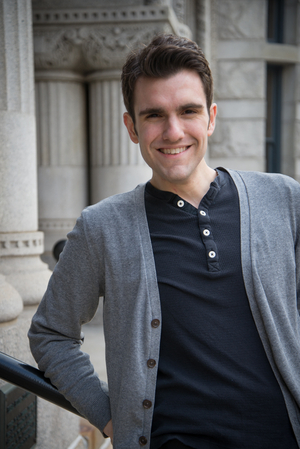 Joe Picchetti is thrilled to be making his Sunstone Studios debut with 'Neath the Hills of Bastogne. Other regional credits include Photograph 51 and Still (Renaissance Theaterworks), A Christmas Carol (Children's Theatre of Madison), The Lion in Winter (Milwaukee Chamber Theatre), A Chorus Line (MOT/Theatre Red), Twelfth Night and Comedy of Errors (Summit Players Theatre), Stones in His Pockets (Windfall Theatre), and A Number (Splinter Group). He would like to thank the whole Bastogne team for creating and shaping this wonderful piece, as well as his family, friends, and Maddy for their never-ending love and support.
Joe Picchetti is thrilled to be making his Sunstone Studios debut with 'Neath the Hills of Bastogne. Other regional credits include Photograph 51 and Still (Renaissance Theaterworks), A Christmas Carol (Children's Theatre of Madison), The Lion in Winter (Milwaukee Chamber Theatre), A Chorus Line (MOT/Theatre Red), Twelfth Night and Comedy of Errors (Summit Players Theatre), Stones in His Pockets (Windfall Theatre), and A Number (Splinter Group). He would like to thank the whole Bastogne team for creating and shaping this wonderful piece, as well as his family, friends, and Maddy for their never-ending love and support.
Zach Thomas Woods
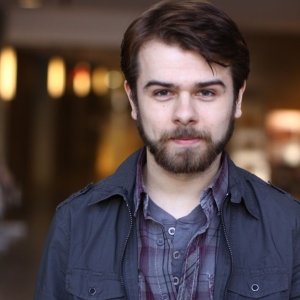 Zach Thomas Woods holds a BFA in acting from the University of Wisconsin Stevens Point. Currently he serves as the Manager of Artistic Direction at the Milwaukee County Zoo’s Kohl’s Wild Theater. KWT presents original TYA performances with an emphasis on environmental conservation to young people throughout southeastern Wisconsin. In the Milwaukee community Woods has served as a theater educator and director for nearly 10 years. Directing credits include Julius Caesar, Evita, Footloose, Death by Design, Arsenic and Old Lace, Moon Over Buffalo, and The Miss Firecracker Contest. As professional performer Woods has appeared at Skylight Music Theatre (The Full Monty, Les Miserables, Hair, Urinetown), Milwaukee Chamber Theatre (Great Expectations), Next Act Theatre (Red Herring, Laughter on the 23rd Floor) and First Stage (Big Fish, Holes, Spookley the Square Pumpkin, Anatole.) An award winning playwright, his original TYA scripts, Aldo Leopold and the Ghost of Sand County and Leona Lionheart Saves the World can often be seen touring the Milwaukee area. Before premiering at Sunstone, ‘Neath the Hills of Bastogne received a staged reading through Milwaukee Chamber Theatre’s Montgomery Davis Play Development Series.
Zach Thomas Woods holds a BFA in acting from the University of Wisconsin Stevens Point. Currently he serves as the Manager of Artistic Direction at the Milwaukee County Zoo’s Kohl’s Wild Theater. KWT presents original TYA performances with an emphasis on environmental conservation to young people throughout southeastern Wisconsin. In the Milwaukee community Woods has served as a theater educator and director for nearly 10 years. Directing credits include Julius Caesar, Evita, Footloose, Death by Design, Arsenic and Old Lace, Moon Over Buffalo, and The Miss Firecracker Contest. As professional performer Woods has appeared at Skylight Music Theatre (The Full Monty, Les Miserables, Hair, Urinetown), Milwaukee Chamber Theatre (Great Expectations), Next Act Theatre (Red Herring, Laughter on the 23rd Floor) and First Stage (Big Fish, Holes, Spookley the Square Pumpkin, Anatole.) An award winning playwright, his original TYA scripts, Aldo Leopold and the Ghost of Sand County and Leona Lionheart Saves the World can often be seen touring the Milwaukee area. Before premiering at Sunstone, ‘Neath the Hills of Bastogne received a staged reading through Milwaukee Chamber Theatre’s Montgomery Davis Play Development Series.
Samantha Martinson
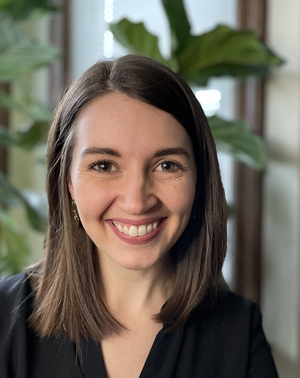 Samantha Martinson is a theater artist and educator—she has worked in administration, education, and production at several regional theaters including Milwaukee Repertory Theater, First Stage, and Door Shakespeare. At Milwaukee Chamber, Samantha facilitates high school playwriting residencies across the greater Milwaukee area and biennially assistant produces the Young Playwrights Festival Showcase. Additionally, Samantha serves on the senior leadership team at Milwaukee Ballet, as their Director of Community Engagement. Samantha previously worked for the Zoological Society of Milwaukee, focusing the majority of her work on grant programs, DE&I initiatives, and the power of fostering empathy for one another. She has presented at national conferences with the Association for Zoos and Aquariums and Advancing Conservation through Empathy for Wildlife Network on the importance of cultivating empathy to increase social action. Her recent directing credits include: LEONA LIONHEART SAVES THE WORLD (Kohl's Wild Theater), STITCHED WITH A SICKLE & HAMMER (Renaissance Theaterworks, Br!nk), THE TEMPEST (Mad Rogues), MISS LULU BETT (Voices Freed Reading Series), TWELFTH NIGHT (Milwaukee Youth Theater). Assistant Directing: THE ROOMMATE (Renaissance Theaterworks), MILWAUKEE CARRIES (Cooperative Performance). Recent performances: SAVIOR'S GRACE (Renaissance Theaterworks, Br!nk Briefs); RICHARD III, THE MERRY WIVES OF WINDSOR, A MIDSUMMER NIGHT'S DREAM (Mad Rogues). samanthamartinson.com
Samantha Martinson is a theater artist and educator—she has worked in administration, education, and production at several regional theaters including Milwaukee Repertory Theater, First Stage, and Door Shakespeare. At Milwaukee Chamber, Samantha facilitates high school playwriting residencies across the greater Milwaukee area and biennially assistant produces the Young Playwrights Festival Showcase. Additionally, Samantha serves on the senior leadership team at Milwaukee Ballet, as their Director of Community Engagement. Samantha previously worked for the Zoological Society of Milwaukee, focusing the majority of her work on grant programs, DE&I initiatives, and the power of fostering empathy for one another. She has presented at national conferences with the Association for Zoos and Aquariums and Advancing Conservation through Empathy for Wildlife Network on the importance of cultivating empathy to increase social action. Her recent directing credits include: LEONA LIONHEART SAVES THE WORLD (Kohl's Wild Theater), STITCHED WITH A SICKLE & HAMMER (Renaissance Theaterworks, Br!nk), THE TEMPEST (Mad Rogues), MISS LULU BETT (Voices Freed Reading Series), TWELFTH NIGHT (Milwaukee Youth Theater). Assistant Directing: THE ROOMMATE (Renaissance Theaterworks), MILWAUKEE CARRIES (Cooperative Performance). Recent performances: SAVIOR'S GRACE (Renaissance Theaterworks, Br!nk Briefs); RICHARD III, THE MERRY WIVES OF WINDSOR, A MIDSUMMER NIGHT'S DREAM (Mad Rogues). samanthamartinson.com
Colin Gawronski
 Colin Gawronski is a lighting designer and theatrical technician native to Milwaukee who has worked extensively with Danceworks, Inc, Milwaukee Chamber Theatre, and Black Arts MKE/Brozeville. They have worked with other local companies such as Renaissance Theaterworks, Milwaukee Opera Theatre, UWM Dance, Next Act, Wildspace, PrideFest Milwaukee, Bard and Bourbon, Gina Laurenzi Dance Project, and In Tandem Theatre. Colin has also worked with the Sacramento Music Circus, the Pennsylvania Shakespeare Festival and with the Indianapolis and Chicago Fringe Festivals. Favorite productions include: STEW, OUT OF MANY ONE, FIRES IN THE MIRROR, IGNITE: A HIP HOP EXPERIENCE (since 2013), SECRETS FROM THE WIDE SKY, RUSSIAN TRANSPORT, FRANKIE AND JOHNNY, STORIES FROM A LIFE, THE GLASS MENAGERIE, SERENDIPITY, MAURITIUS, THRILL ME, IN A BLACK MOOD, MY FAIR LADY, LAMPS FOR MY FAMILY, and VAGABONDARE. Give Love Always.
Colin Gawronski is a lighting designer and theatrical technician native to Milwaukee who has worked extensively with Danceworks, Inc, Milwaukee Chamber Theatre, and Black Arts MKE/Brozeville. They have worked with other local companies such as Renaissance Theaterworks, Milwaukee Opera Theatre, UWM Dance, Next Act, Wildspace, PrideFest Milwaukee, Bard and Bourbon, Gina Laurenzi Dance Project, and In Tandem Theatre. Colin has also worked with the Sacramento Music Circus, the Pennsylvania Shakespeare Festival and with the Indianapolis and Chicago Fringe Festivals. Favorite productions include: STEW, OUT OF MANY ONE, FIRES IN THE MIRROR, IGNITE: A HIP HOP EXPERIENCE (since 2013), SECRETS FROM THE WIDE SKY, RUSSIAN TRANSPORT, FRANKIE AND JOHNNY, STORIES FROM A LIFE, THE GLASS MENAGERIE, SERENDIPITY, MAURITIUS, THRILL ME, IN A BLACK MOOD, MY FAIR LADY, LAMPS FOR MY FAMILY, and VAGABONDARE. Give Love Always.
Lauren Instenes
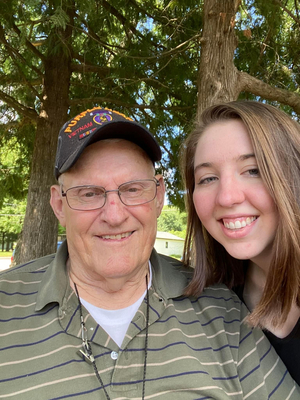 Lauren is a Wisconsin theater kid who grew up in Racine, volunteering at the Racine Theater Guild. As an undergrad she studied History and Theater from Wittenberg University and she holds an MA in oral history from Columbia University. Other stage management credits include The Taming (Sunstone Studios), Lombardi (RTG), The Tempest (Bard & Bourbon). She is grateful for her parents who have shared their love of theater with her, and to Sarah and her sweet pug Gator for their love and support. She is dedicating this show to her grandfather and Army veteran, Papa Bickford.
Lauren is a Wisconsin theater kid who grew up in Racine, volunteering at the Racine Theater Guild. As an undergrad she studied History and Theater from Wittenberg University and she holds an MA in oral history from Columbia University. Other stage management credits include The Taming (Sunstone Studios), Lombardi (RTG), The Tempest (Bard & Bourbon). She is grateful for her parents who have shared their love of theater with her, and to Sarah and her sweet pug Gator for their love and support. She is dedicating this show to her grandfather and Army veteran, Papa Bickford.
Special Thanks from the Playwright:
Marcella Kearns, Michael Wright, Michael Stebbins, and Milwaukee Chamber Theatre
Renegade Writers Group
Tom and Mary Woods for a sense of historical curiosity
Alicia Rice for enduring thousands of hours of WW2 lectures
